- Home
Elbe
Excursions on the Elbe river

We'll head to the Strahov Monastery, whose library holds over 200,000 works—making it one of the most valued and best preserved in Europe. The oldest, baroque-style section of the current library, the Theological Hall, dates back to the 17th century. The main hall, known as the Philosophical Hall, has two-story-high vaulted ceilings that are neo-classical in style. Frescoes by Siardo Nosecký and Anton Maulbertsch adorn the hall ceilings. We'll then continue on to Loreta. Located in Hradcany, also known as the Castle District, the complex consists of a cloister, a church, and a clock with a famous chime. The Italian-inspired complex dates back to 1626. Make sure you stick around to hear the bells ring on the hour to a melody composed by Dvorak. Today, the complex houses a large collection of liturgical objects, many from the 14th to the 18th century—including a monstrance with 6,222 diamonds.
PLEASE NOTE
- The order of the visits can change.
- Times are approximate.
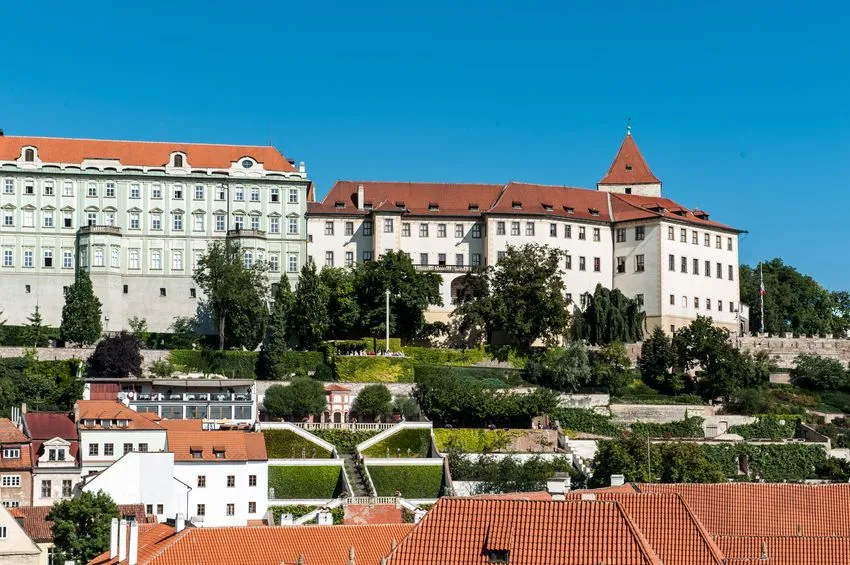
We'll leave by coach for the castle complex, Lobkowicz Palace, built in the 16th century in the Renaissance style. The castle underwent significant architectural changes after the Thirty Years’ War, moving to a more baroque style. We'll discover the largest and oldest private collection in Europe in the enchanting palace, strolling through its majestic rooms overflowing with impressive works of art. Twenty-two galleries hold the exhibit, illustrating the challenges the Lobkowicz family has faced over the centuries. Objects include personal items and priceless works, such as manuscripts from Beethoven and Mozart and paintings by Canaletto, Diego Velázquez, and Pieter Bruegel the Elder.
PLEASE NOTE
- Wear comfortable, sturdy walking shoes.
- The order of the visits can change.
- Times are approximate.
Depart by coach from the boat to discover the German capital with a local guide, who will introduce you to the monuments and many facets of this historic city. You will head toward the Brandenburg Gate, a strong symbol of German unity, in front of which stands a majestic Christmas tree. Next, head to the Victory Column, which dominates the city, before admiring the imposing Television Tower, offering an exceptional panoramic view of Berlin. The tour continues through historic places: the Reichstag, the seat of the German Parliament, and Checkpoint Charlie, a poignant reminder of the Cold War. You will also pass by the Red Town Hall before discovering the Kaiser Wilhelm Memorial Church, partially preserved in ruins as a symbol of Berlin's resilience. Finally, the Humboldt Forum, a prominent cultural and historical site, will conclude this exploration. To end this discovery on a sweet note, enjoy a quintessential German tradition: Kaffee-Kuchen. Sit back and indulge in German specialties such as Apfelstrudel, a puff pastry with apples and cinnamon, a creamy Käsekuchen, or a delicious Schwarzwälder Kirschtorte, the famous Black Forest cake combining chocolate, cherries, and whipped cream. A perfect gourmand break to appreciate the Berlin way of life during this festive season. Return to the boat.
PLEASE NOTE
- The order of the visits can change.
- Times are approximate.
Thanks to its remarkable heritage and magical atmosphere, Dresden shines brightly during the holiday season, offering an enchanting backdrop for winter traditions. You will begin with a walking tour of the Old Town, passing by the Zwinger Palace, the opera house, the cathedral (the Church at the Court), and the impressive 101-meter-long mural "Procession of Princes," which depicts the history of the ruling Wettin dynasty of Saxony, before reaching the majestic Frauenkirche. Then, let yourself be captivated by the magic of Dresden's Christmas Market, the Striezelmarkt, one of the oldest in Germany. Nestled in Altmarkt Square, in the heart of the city, this historic market perfectly embodies the authenticity of German Christmas traditions. Immerse yourself in its fairy-tale atmosphere, where handmade decorations and festive entertainment create an enchanting ambiance. The market takes its name from the Striezel, a traditional pastry that has now become the famous Stollen, emblematic of the holiday season in Germany. You will also encounter the charming Pflaumentoffel, small prune figurines dressed as chimney sweeps, symbols of good luck and a must-have during this winter celebration. Return to the boat.
PLEASE NOTE
- The order of the visits can change.
- Times are approximate.
Departure by coach with local guides. In Potsdam, the visit will begin with a walk through the gardens of Sanssouci, where you will climb the paths and stairs leading to the grand terrace, home to the summer residence of Frederick II, known as the Great, the Sanssouci Palace, built between 1745 and 1747. Frederick II resided there to relax, away from the formalities of the Berlin court. The king’s personal tastes had such an influence on the design and decoration that it is sometimes referred to as “Frederician Rococo.” You will then take a coach tour around the Sanssouci park to admire its many remarkable buildings. Your visit will continue with a stop at the "Blauer Lichterglanz" Christmas Market, famous for its blue lights that illuminate the market in a spectacular way. These lights create a unique ambiance, bathing the area in an enchanting glow. The festive atmosphere of the market is enhanced by this illumination, offering a fairy-tale backdrop that transforms the site into a true Christmas kingdom.
PLEASE NOTE
- The order of the visits can change.
- Times are approximate.
- On the Amsterdam-Berlin route, the boat sails during the excursion.
- Please note, the interior of the Sanssouci Park castles is not included in this visit. This is exclusively a tour of the gardens.
Transfer by coach to the historic heart of Wittenberg. Stroll through the market square, where carousels, Renaissance houses, and the aroma of mulled wine create a fairy-tale atmosphere. You will admire the Town Hall and the statues of Luther and Melanchthon, both enhanced by Christmas decorations. You will visit Martin Luther's house. Once an Augustinian monastery, it was the place of Luther's life and work for 35 years. Since 1883, the house has been transformed into a museum and is now the largest museum in the world dedicated to the history of the Protestant Reformation. Next, visit the Gothic St. Mary's Church, where Luther preached. Further on, you will also see the Cranach House, whose portraits are now displayed in the greatest museums. Then, you will enter the Castle Church, considered the heart of the Reformation. The 95 theses of Luther are reproduced on its doors. The splendid Advent crown of the church symbolizes the waiting for the great day and the preparation for Christmas. Return to the boat.
PLEASE NOTE
- The order of the visits can change.
- Times are approximate.
You will be invited to a concert in a sumptuous setting, where the musical heritage of the Czech Republic will be brought to light. A string quartet will take you on a journey through the timeless masterpieces of Mozart, Dvořák, and Smetana. You will sail on the mythical waters of the Vltava, the river made immortal by Smetana in his symphonic poem The Moldau. Prague played a crucial role in the career of Wolfgang Amadeus Mozart, which is all the more remarkable considering that it was not yet the epicenter of European classical music. Yet, it was in this city that he found a passionate and loyal audience, who cheered him on during the premieres of his most famous operas. The association between Mozart and Prague, though not obvious, reveals the profound and unexpected influence this city had on him. Dvořák, for his part, drew inspiration from Czech traditions, creating iconic works like his Slavonic Dances. Return to the boat.
PLEASE NOTE
- The order of the visits can change.
- Times are approximate.
Departure by boat for a guided tour of Litomerice. The royal town of Litomerice, located at the confluence of the Elbe and Ohre rivers, is one of the most beautiful towns in the Czech Republic. The vast historic center features dozens of streets and a large square. The colorful Gothic, Baroque, and Renaissance houses in the city center, largely surrounded by a well-preserved Gothic wall, will fascinate you. The charm of Litomerice also captivated Karel Hynek Mácha, the greatest Czech Romantic poet. You will then enter the wonderful St. James Church, a Baroque masterpiece whose architecture bears traces of the conflicts that shaped the region. In this majestic setting, Christmas melodies echo, amplified by the exceptional acoustics of the organ, creating a suspended moment between emotion and enchantment.
PLEASE NOTE
- The order of the visits can change.
- Times are approximate.
- If St. James Church is unavailable, the visit will be replaced by a similar church.
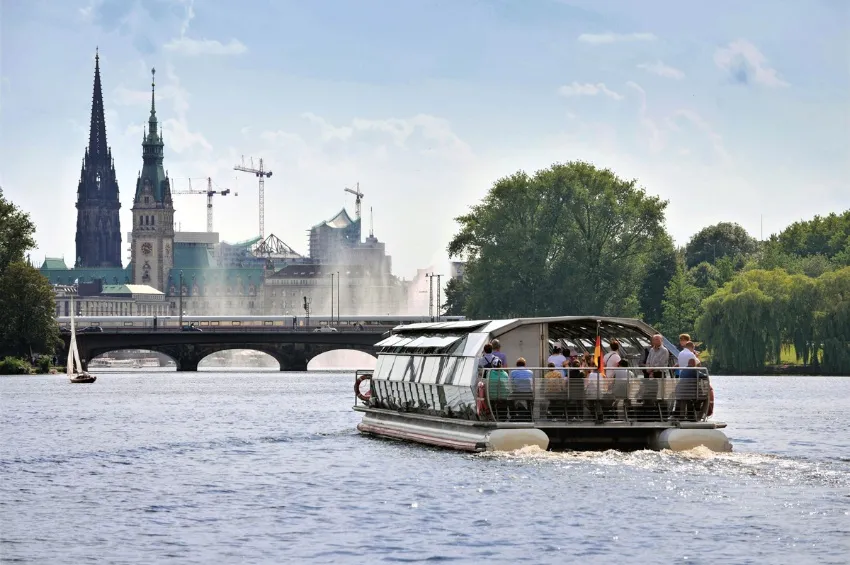
Set off by coach to visit Hamburg. Viewed as one of Germany's prettiest cities, this Hanseatic town has preserved a rich heritage through the centuries. We'll start off with a panoramic tour of the city by coach. You'll get to see Hamburg's main spots such as the city center with the Mönckerberstrasse, the Alster, the Rathaus (Town Hall) located in Rathausmarkt square (the market square), the Stock Exchange and St Michael's Church. We'll move on through the historic center, the oldest district in the city. There, you'll get to see the Alster, a large lake located right amidst the city, the imposing 1897 Neo-Renaissance style building that is the Town Hall, the 10-story Chilehaus which stands as an emblem of expressionist architecture with its Eastern façade resembling a ship's bow, and Deichstrasse, an old shopping street with trading posts and houses dating from the 17th and 19th centuries. Free time before returning on board by coach.
PLEASE NOTE
- The order of the visits can change.
- Times are approximate.
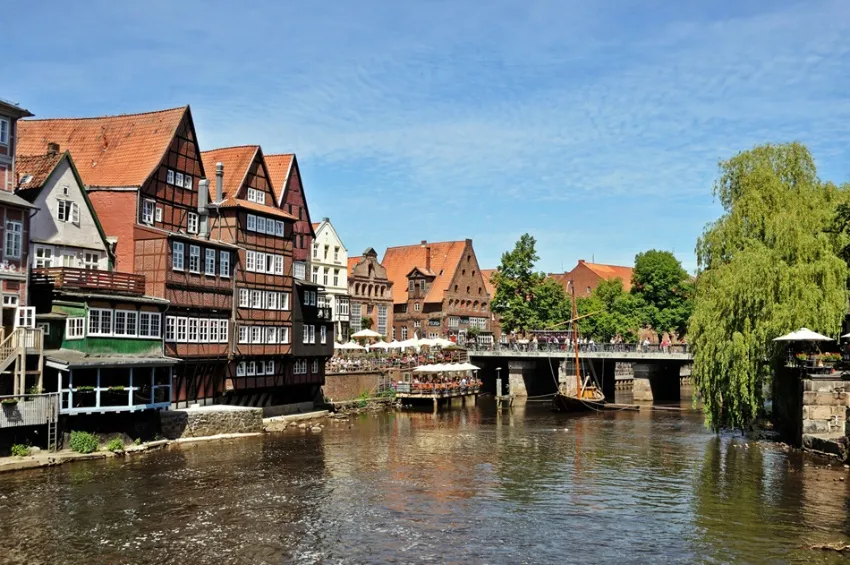
Guided tour of Lüneburg, undoubtedly one of the best preserved Hanseatic towns. In the Middle Ages, it was one of the richest towns in Germany, thanks to its salt deposits. From this prosperous time, the old town has preserved all its traditional architecture in cabled bricks, forming coiled gables and spirals. In the harbour area, you cannot miss the old crane (Alter Kran, from the 14th century). Then you will see the Town Hall, whose construction was spread out between the 13th and 18th centuries. You will admire the gothic-style Princes' Hall (Fürstensaal), the Court Hall (Gerichtslaube) with a barrel vault dating from the 14th century, and the great meeting room, a Renaissance masterpiece ornate with frescoes from the 16th century. Entirely paneled in wood, it is the very symbol of the rapid growth of the city.
PLEASE NOTE
- The order of the visits can change.
- Times are approximate.
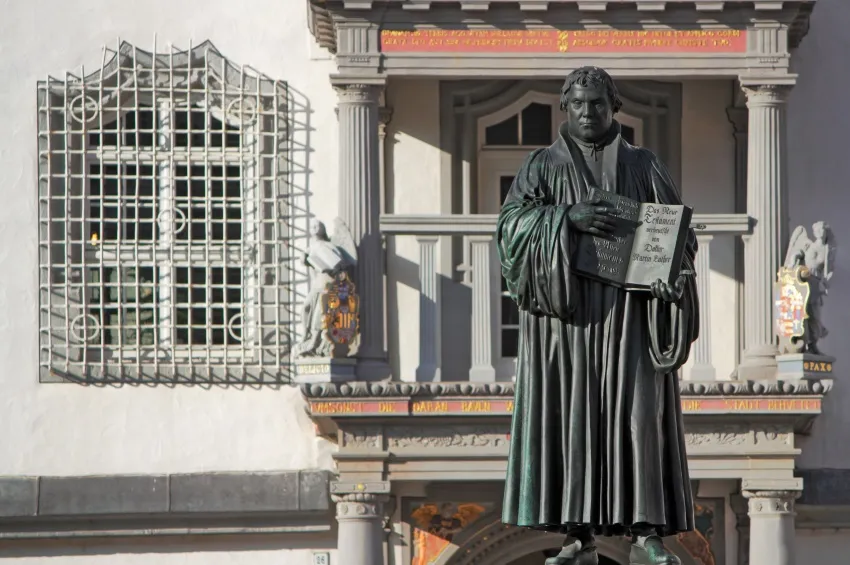
We'll leave from our ship for a guided tour of Lutherstadt Wittenberg. Lutherstadt Wittenberg is the home town of Dr. Martin Luther, the Great Reformer, and the city is affectionately known as the "Cradle of the Reformation”. You'll discover the city center and its noble Renaissance-style houses. Everywhere you turn, there's a spot associated with Martin Luther's life, and various sites throughout the city were added to the UNESCO world heritage list in 1996. A stream runs along the main street, partially underground. Half way along, the street opens out into an attractive square, or Markt, with a statue of Luther and Philip Melanchthon, his collaborator.
The Castle Church is the famous church where he nailed his 95 Theses to the door. Luther gave some of his sermons in this church and now is buried just under the pulpit. The church was severely damaged twice during wars in the centuries following the Reformation, but it was rebuilt each time. We'll also visit Luther's house (1). Part of the Augustinian monastery in which Luther lived, first as a monk and later as owner with his wife and family, is preserved and considered to be the world's premier museum dedicated to Luther, including a permanent exhibition about the time of the Reformation. At the end of the afternoon, we'll return to the ship by coach.
PLEASE NOTE
- Wear comfortable, sturdy walking shoes.
- During the excursion, our boat will cruise.
- The order of the visits can change.
- Times are approximate.
- (1) If the Luther House is unavailable, it will be replaced by a tour of Wittenberg Castle Church.
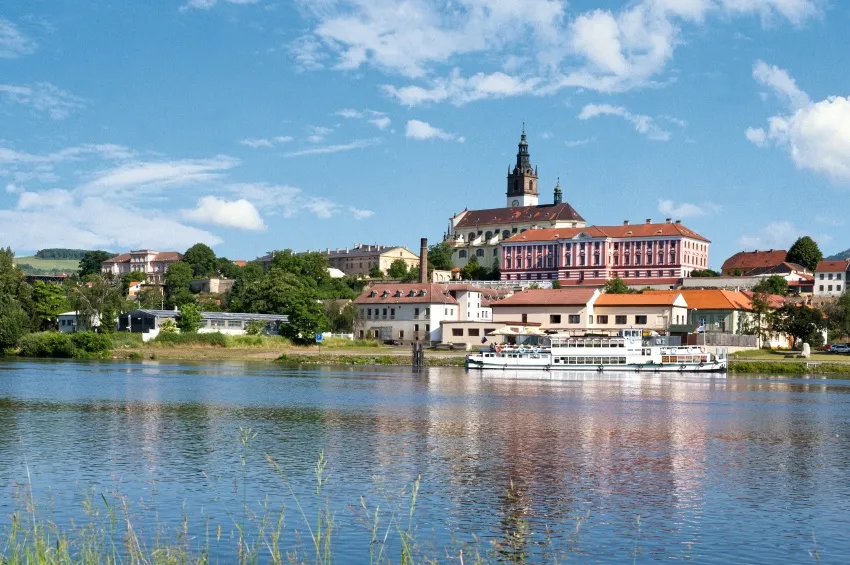
We'll leave from our ship for a guided tour of Litomerice. This royal city on the confluence of the Elbe and Ohre is one of the most beautiful in the Czech Republic. The extensive historical center has dozens of streets and squares. The colorful Gothic, Baroque and Renaissance buildings bordered to a great extent by well-preserved Gothic fortifications will delight you. Karel Hynek Mácha, the greatest Czech romantic poet, also succumbed to the charm of Litomerice. A delightful glass at the nearby Velké Zernoseky winery will certainly make your walk through the city all the more pleasant.
Allow yourself to be enchanted by the rare architecture of the houses on the squares: the Saxon Renaissance town hall, the "Kalich” House with a roof terrace where the rich townsfolk used to meet over a glass of wine, and the "Cerný orel” House, which has preserved its original appearance with wonderful sgraffito work. There are also countless important churches such as the Gothic Church of All Saints with its Renaissance broach roofs, the Church of the Annunciation of the Lady Mary representing the pinnacle of work by the Italian architect Antonio Octavio Broggio and the Baroque Cathedral of St. Stephen, which was built by Domenico Orsi. Our visit will be followed by a beer tasting*. After our tour, we'll return to the ship.
PLEASE NOTE
- Wear comfortable, sturdy walking shoes.
- The order of the visits can change.
- Times are approximate.
- *Alcohol can be harmful to your health. Please drink in moderation.
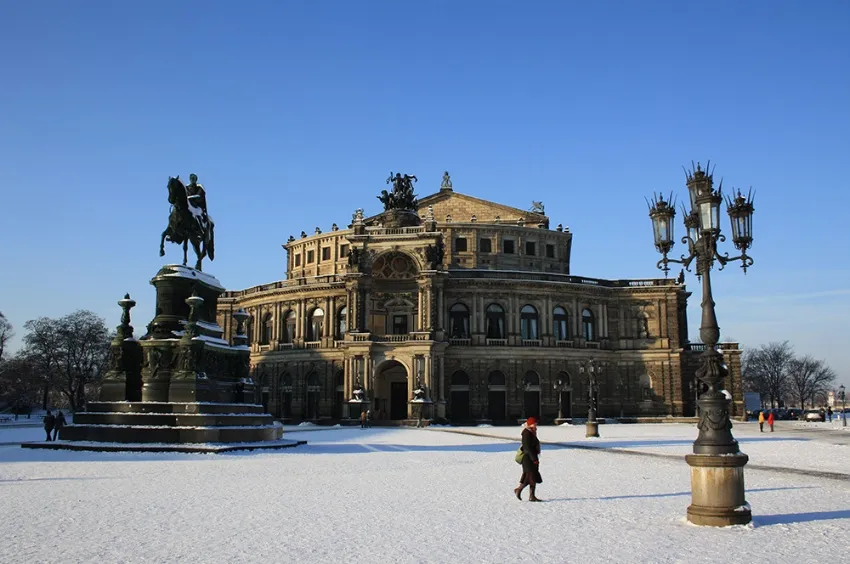
Join us for a guided tour of the city known as the "Florence of the Elbe”. Dresden offers a wide variety of attractions, including magnificent promenades on the bank of the Elbe, fascinating museums, monuments, and charming details. Our visit will begin with a panoramic tour, where you'll get an overview of the most important must-see sights: the Altmarkt Square, German Hygiene Museum (exteriors only), Baroque Quarter, Transparent Factory (VW) and soccer stadium.
We'll then visit the historical old city on foot, passing in front of the Zwinger, Semper Opera House, cathedral, Royal Palace, Brühl Terrace, and Neumarkt Square.
After some free time on your own, we'll return to the ship.
PLEASE NOTE
- Wear comfortable, sturdy walking shoes.
- The order of the visits can change.
- Times are approximate.
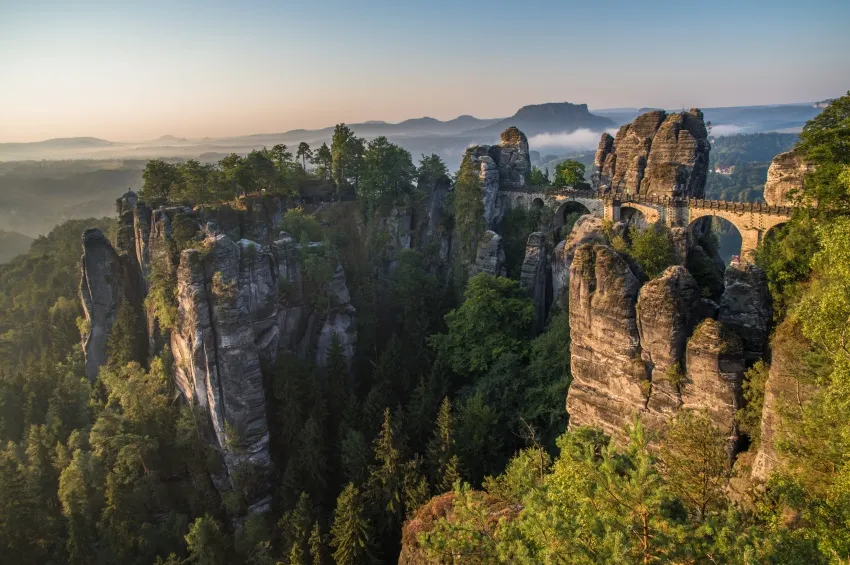
We'll leave by coach for an excursion to the Elbe Sandstone Mountains, a range straddling the border between the state of Saxony in Southeastern Germany and the North Bohemian region of the Czech Republic. The most striking characteristic of this deeply dissected rocky mountain range is the extraordinary variety of terrain within the small area. The river Elbe runs through the mountain range in a steep and narrow valley, and the hills are dotted with châteaux such as the Königstein Fortress and Hohnstein Castle. We'll visit the Königstein Fortress, dating back beyond the 13th century. Because the fortress was regarded as unconquerable, the Saxon monarchs retreated to it during times of crisis and also deposited many works of art from the famous Zwinger here. In the 20th century, it was used as a prison, a prisoner of war camp, and after the wars, a re-education camp for delinquent youths who did not fit the image of a socialist society. The location offers magnificent views of the Elbe River and the surrounding mountain ranges. After our tour, we'll return on board our ship.
PLEASE NOTE
- The order of the visits can change.
- Times are approximate.
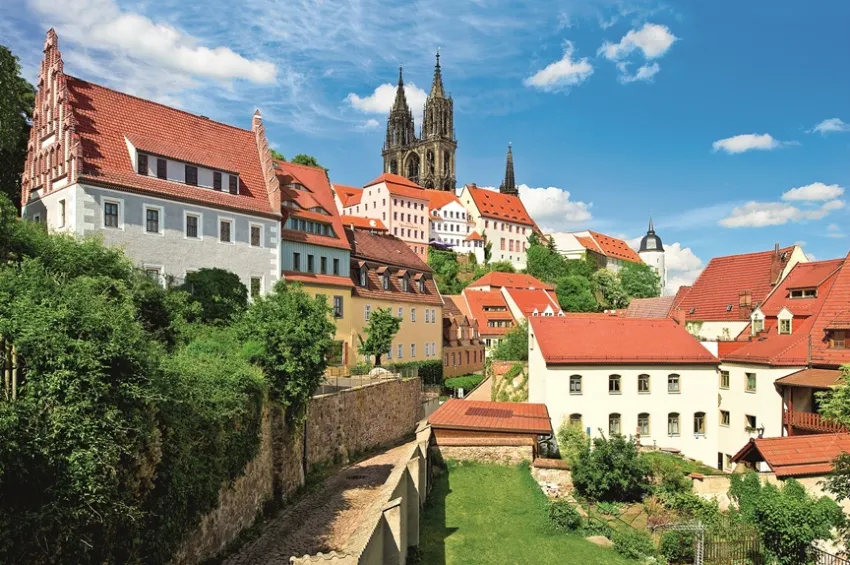
We'll leave from our ship for a guided tour of Meissen. The city is famous for its porcelain, based on extensive local deposits of both china and potter's clay. Meissen is sometimes known as the "cradle of Saxony". Its historical district is located mostly around the market at the foot of the castle hill and contains many Renaissance-style buildings, as well as two Late-Gothic buildings: the town hall and the Frauenkirche. The Frauenkirche tower hosts the world's first porcelain carillon, manufactured in 1929 on the occasion of the town's 1000-year jubilee.
After touring the city, we'll visit the porcelain factory. The intricacy of the figures and sculptures and the perfection of the hand-painted patterns are the things that underscore this magnificent form of art. In the museum, you'll take an enticing journey through more than 300 years of porcelain history. After some free time on your own, we'll return to the ship in Dresden.
PLEASE NOTE
- Wear comfortable, sturdy walking shoes.
- During the excursion, our boat will cruise.
- The order of the visits can change.
- Times are approximate.
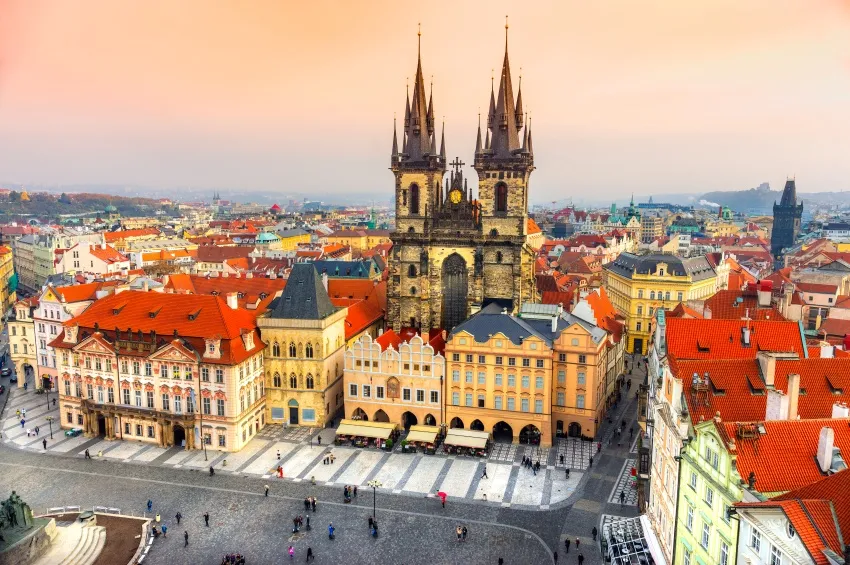
Prague is the capital and largest city of the Czech Republic as well as the fourteenth largest city in the European Union. It is located in the north-west of the country on the Vltava River, and is home to about 1.26 million people.
Located at the very heart of Central Europe, Prague was once the capital of the Kingdom of Bohemia, the Holy Roman Empire and Czechoslovakia. The “City of a Hundred Spires” was miraculously spared during World War II and its architecture, mixing Pre-Romanesque, Romanesque, Gothic, Baroque, Rococo, Art Nouveau and Cubist styles, gives Prague its unique flavor. The city was deeply marked by the 1968 Prague Spring–the short-lived season of the “socialism with a human face” aiming at the renovation of institutions in a democratic way–which strongly inspired Czechoslovak culture from the 60s to the 80s. Prague’s historic city center was added to the UNESCO World Heritage List in 1992.
We’ll have a guided walk in the old city starting with the Old Town Square–the busiest area in Prague–and its beautiful archways. We’ll see Jan Hus Memorial, built in honor of this church reformer who was burned at the stake for heresy in 1415, as well as the Old Town Hall and its fascinating astronomical clock featuring the hourly show of figures of the Apostles striking the time, the Gothic Church of Our Lady before Týn, the Ungelt and the merchants’ yard. We’ll also get to admire the Municipal House, the city's foremost Art Nouveau building, and one of the finest in Europe, as well as the Powder Gate, one of the original 13 entrances to Prague's Old Town. We’ll return on board after our visit.
PLEASE NOTE
- Wear comfortable, sturdy walking shoes.
- The order of the visits can change.
- Times are approximate.
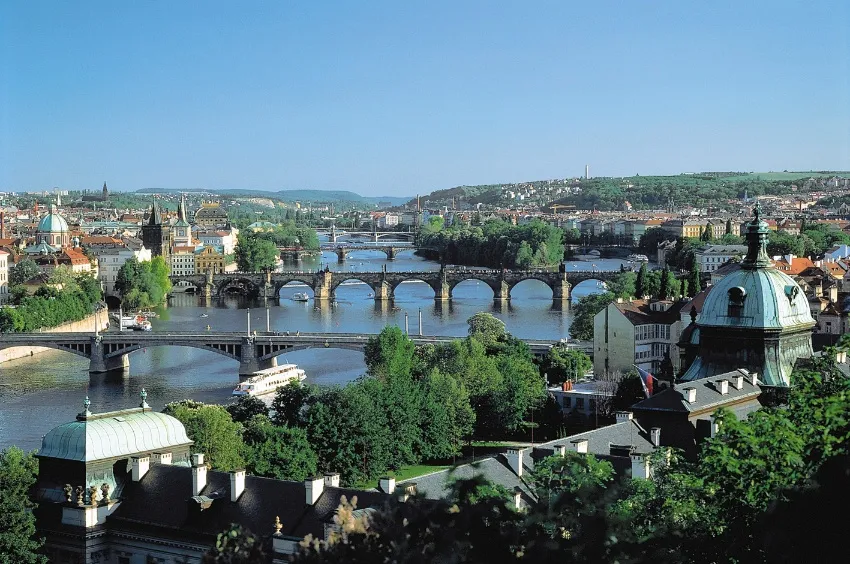
We'll leave on a guided tour of the Hradcany, or Castle District, in Prague. The city center is divided into five areas, spanning both banks of the Vltava River, and Prague Castle is the most prominent tourist attraction. Set on a hill, it affords visitors fine views over the whole city.
Founded in 880 AD, it is the largest medieval castle in Europe and was once the seat of the Kings of Bohemia. Today, the President of the Czech Republic rules from here. The Prague Castle complex covers over 7 hectares (18 acres) and has three large courtyards. Destructive wars and fires (and the subsequent renovations), along with differing political forces, have resulted in an intriguing mix of palaces, churches, great halls, state apartments, a monastery, viewing towers, fortifications, museums and art galleries. You'll get to discover, among other sights, St. Vitus Cathedral, the Old Royal Palace with its Vladislav Hall, St. George's Basilica and the famous Golden Lane. We'll return on board after our visit.
PLEASE NOTE
- Wear comfortable, sturdy walking shoes.
- The order of the visits can change.
- Times are approximate.
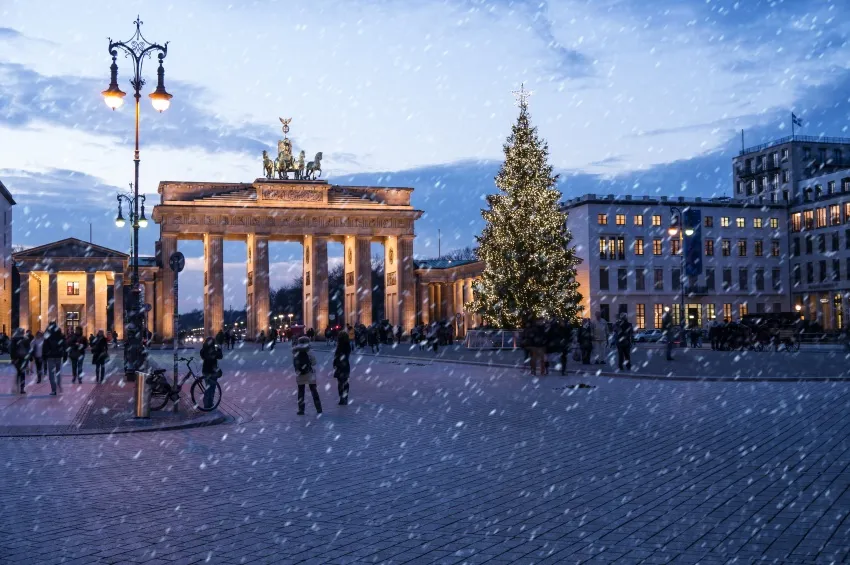
Take a guided panoramic tour of Berlin in a coach. You'll see the city's main sites including Charlottenburg Palace and the government and embassy districts. We'll continue to the eastern side of the city where you'll see the Pariser Platz, French embassy, Academy of Arts, the renowned Unter den Linden, Brandenburg Gate, Berlin State Library, Humboldt University, the opera house, the Zeughaus and Berlin Cathedral. We'll also see Museum Island, Alexanderplatz, St. Nicholas Quarter (birthplace of the city), the city palace, Ministry of Foreign Affairs, the Gendarmenmarkt, Neue Kirche and the Konzerthaus Berlin. No tour of Berlin would be complete without a visit to Checkpoint Charlie, the vestiges of the wall, and Potsdamer Platz — rebuilt to contemporary perfection after being destroyed during WWII and left desolate during the Cold War. To finish up, we'll stop off at one of the city's Christmas markets before returning to the ship.
PLEASE NOTE
- The order of the visits can change.
- Times are approximate.
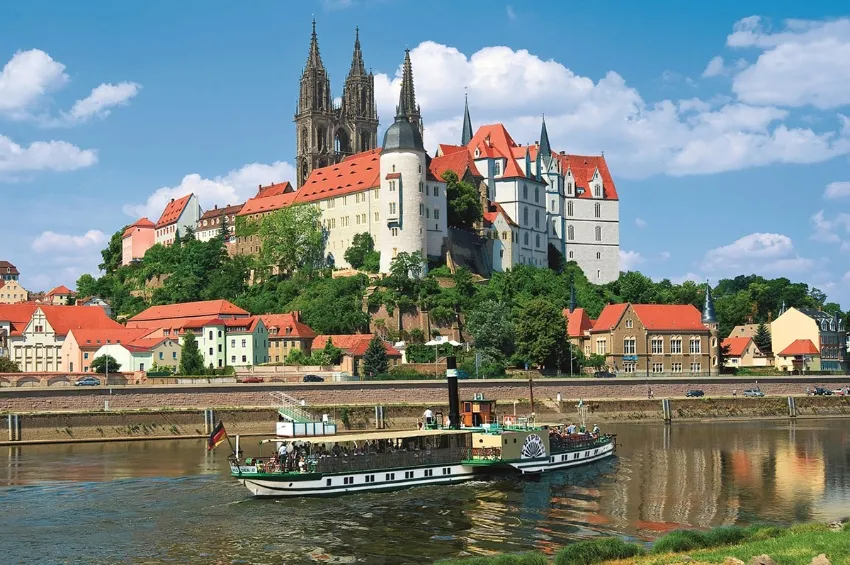
We'll leave from our ship for a guided tour of Meissen. The city is famous for its porcelain, based on extensive local deposits of both china and potter's clay. Its historic district is located mostly around the market at the foot of the castle hill and contains many Renaissance-style buildings, as well as two late-Gothic buildings: the town hall and the Frauenkirche. The Frauenkirche tower hosts the world's first porcelain carillon, manufactured in 1929 on the occasion of the town's 1,000-year jubilee. After touring the city, we'll visit the porcelain factory. The intricacy of the figures and sculptures and the perfection of the hand-painted patterns are what underscore this magnificent form of art. We'll learn about the steps needed to make each piece. After some free time on your own, we'll return to the ship in Dresden.
PLEASE NOTE
- The order of the visits can change.
- Times are approximate.

Tour of Meissen: The Cradle of Saxony
This city is famous for its porcelain, based on extensive local deposits of both china and potter's clay. Its historic district is located mostly around the market at the foot of the castle hill and contains many Renaissance-style buildings, as well as two Late-Gothic buildings: the town hall and the Frauenkirche. In the distance, you'll be able to see the impressive Albrechtsburg. We'll then visit the city's Christmas market, magnificently located in the heart of the historic district. You'll not only find the famous Meissen porcelain, but also candles, holiday decorations, wooden sculptures and traditional local delicacies. During December, the facade of the town hall is turned into a giant advent calendar. Following our tour, we'll return to the ship.
PLEASE NOTE
- The order of the visits can change.
- Times are approximate.
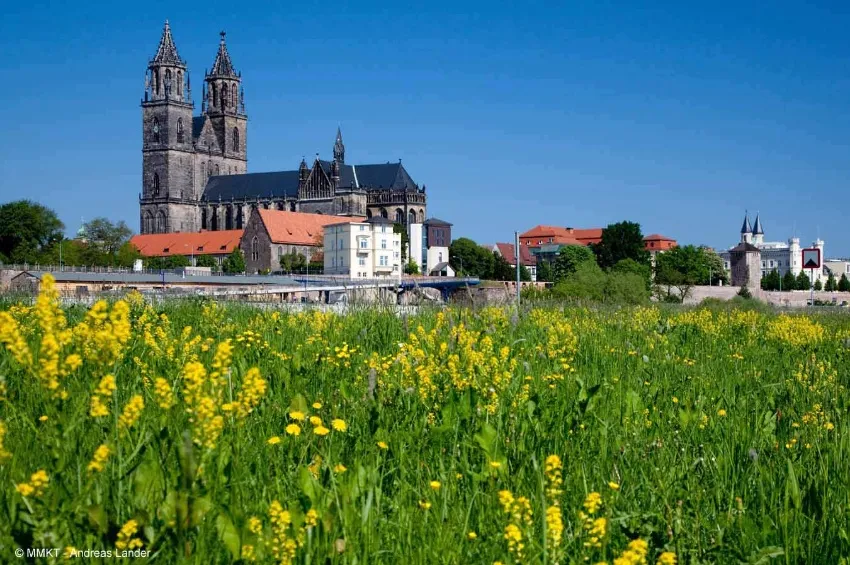
We'll begin our tour with the Magdeburg Cathedral, home to the tomb of Emperor Otto I the Great. Magdeburg is a Hanseatic city located midway on the Elbe River and the Roman Roads—in the heart of Germany rich with a multi-faceted history. Its other sacred monuments include the Magdalenekapelle, St. Petrikirche, Wallonerkirche, Monastery of Our Lady and St. John's Church. We'll continue our panoramic tour by seeing the city's main monuments, including the citadel. Once located in East Germany, the city has retained its grey, square, Soviet-style buildings which are embellished today with molding and decorations. We'll visit the marketplace to see the magnificent replica of the Magdeburger Reiter, as well as the town hall and its bronze door. You'll finish up the tour with some free time on your own.
During the holiday cruise, you'll be able visit the Christmas market in the city before returning to the ship.
PLEASE NOTE
- The order of the visits can change.
- Times are approximate.
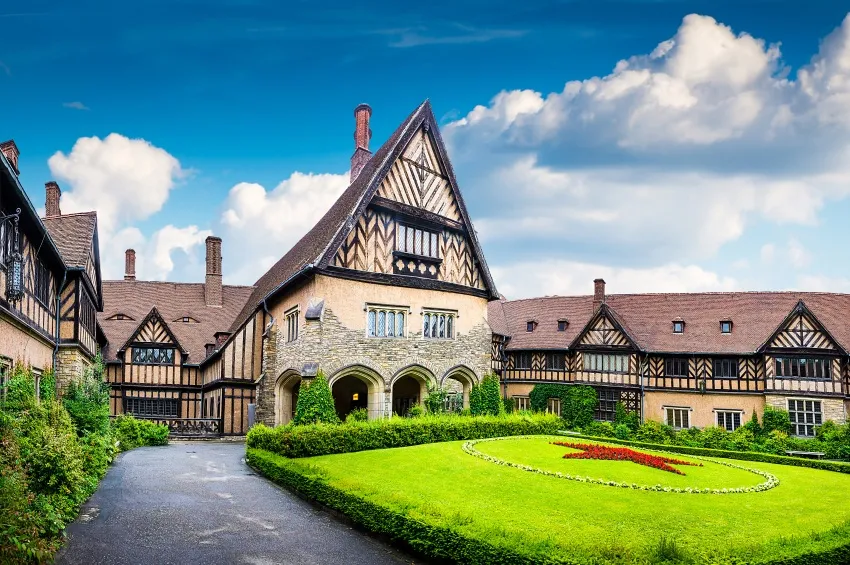
Cecilienhof Palace was built from 1914 to 1917 for Crown Prince William and his wife, Cecilie of Mecklenburg-Schwerin. It was based on English Tudor-style buildings featuring half-timbered walls, bricks and numerous decorative chimney stacks. Cecilie lived in the castle until 1945. After the end of WWII, the Potsdam Conference—attended by Stalin, Churchill and Truman—was held in the palace from July 17 - August 2, 1945. Currently, the palace is home to a museum and a hotel. In 2007, it was the site of the G8 Foreign Ministers Summit.
You'll be able to visit the princess' private writing room, the Red Salon (used by the Soviet delegation as a study during the Potsdam conference), the Great Hall, the Smoking Room (used by the American delegation) and the library (used by the British delegation). At the end of the afternoon, we'll return to the ship by coach.
PLEASE NOTE
- The order of the visits can change.
- Times are approximate.

We’ll leave by coach for a guided tour of Lutherstadt Wittenberg’s old town, first visiting the Luther House. A former Augustinian monastery, it was for 35 years the home and place of work of Martin Luther. The house was transformed into a museum in 1883 and remains to this day the largest museum in the world dedicated to the history of the reformation. You’ll also get to see the outside of Melanchthon’s house, where Luther’s disciple lived and died. Next you’ll head to St. Mary’s town church where Martin Luther used to preach, and move on to painter Cranach’s house, whose portraits are now exhibited in the most prestigious museums around the world. Afterwards, you’ll visit the All Saints’ Church. Don’t miss its doors on which a reproduction of Luther’s 95 theses are nailed. In this very church are the tombs of both Martin Luther and Philip Melanchthon. We’ll return on board.
PLEASE NOTE
- The order of the visits can change.
- Times are approximate.

Join us for a guided visit of the Semper Opera House of Dresden. It is one of the most famous opera houses in the world. Built and rebuilt three times over the span of 130 years, this magnificent Baroque building is one of the most beloved in the city. The renowned conductor Franz Konwitschny once declared that for Dresden, opera was a necessity, an essential part of life. With over 95% of the seats filled for performances, the Semper Opera House is without a doubt one of the most dynamic in Germany.
PLEASE NOTE
- The order of the visits can change.
- Times are approximate.
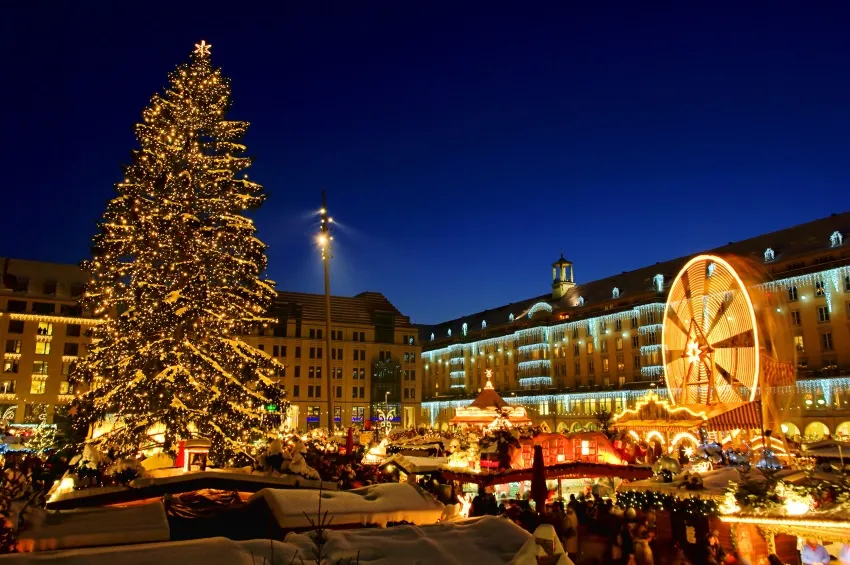
We'll enjoy a guided tour on foot of Dresden's historic old city. Strolling across the area, we'll see the Theaterplatz, Semper Opera House, the Zwinger inside courtyard, cathedral, George Gate and Brühl Terrace. Following our tour, we'll return to the ship.
PLEASE NOTE
- The order of the visits can change.
- Times are approximate.
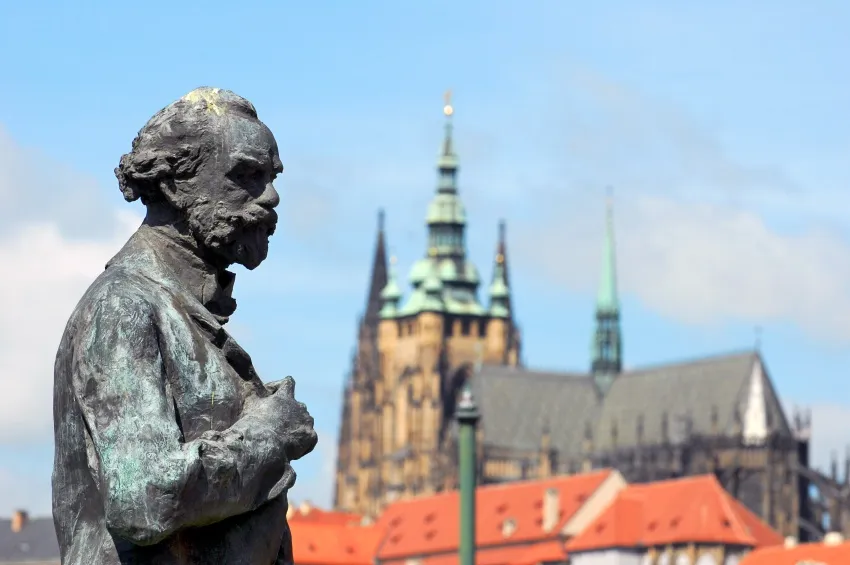
Join us for a tour of Nelahozeves Castle and the birth house of Antonin Dvorak. We’ll visit one of the most beautiful Renaissance castles in Bohemia that was home to 23 different Bohemian queens and princesses. The castle walls are elaborately adorned with Italian-style stucco and wall paintings depicting scenes from the Old Testament and Greek mythology. It is also home to a rich, private collection of furniture and paintings—including works by Rubens, Velazquez, and many others—all belonging to the Lobkowicz family, the oldest and most eminent Bohemian noble family. We’ll discover the luxurious lifestyle of the Bohemian nobility during the Baroque period. At the end of our tour, you’ll enjoy tasting a selection of wines from the castle’s vineyard.
PLEASE NOTE
- The order of the visits can change.
- Times are approximate.
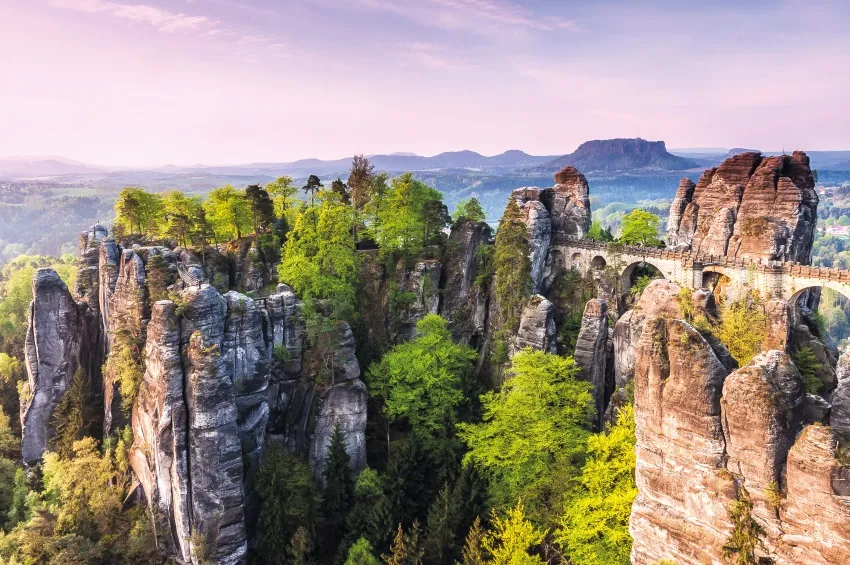
We’ll set off on a full-day excursion to the Elbe Sandstone Mountains, a range straddling the border between the state of Saxony in southeastern Germany and the North Bohemian region of the Czech Republic. The immense sandstone shapes in the national park were carved by erosion over millions of years. Here, you can see Nature’s wonders in full force. We’ll discover Königstein Fortress, perched on top of a plateau overlooking the river below. Also known as the “Saxon Bastille,” the fortress was once used as a location for private festivities and ceremonies for the Saxon court, as well as a state prison. Today it is an open-air, military museum and the top tourist site in the region.
We’ll enjoy lunch in a local restaurant. After, we’ll stop at the Bastei rock formation towering above the Elbe that was formed by water erosion over one million years ago. The rock outcrop juts 646 feet into the air above the Elbe River. The views of the verdant valley and the rock towers from the bridge are unrivaled.
PLEASE NOTE:
- The order of the visits can change.
- Times are approximate.
- INCLUDED in the BED and DBE cruises.
- These rates are approximate and are subject to change without prior notice.
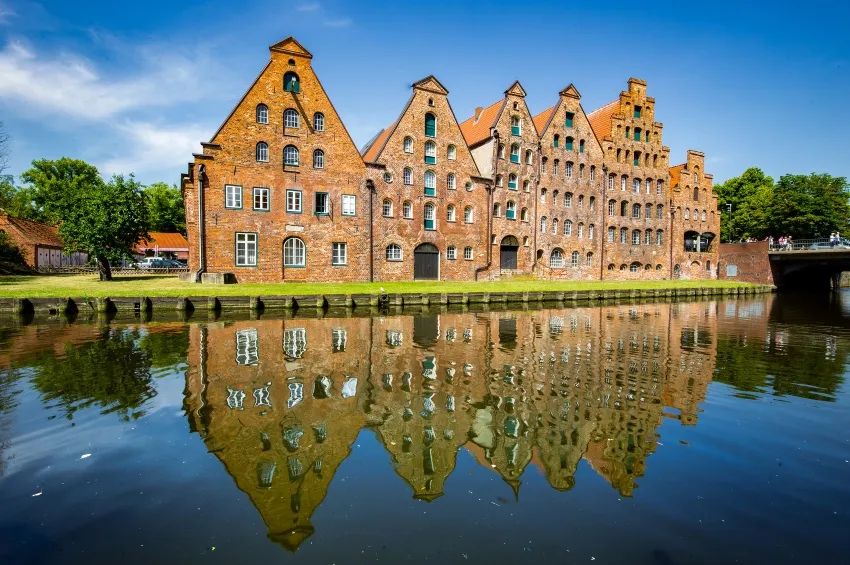
Guided tour of Lübeck. Known as the “Queen of the Hanseatic League,” Lübeck was founded in 1143 by Adolf II, Count of Schauenburg and Holstein. UNESCO lists the city as a World Heritage Site because of its aristocratic homes and numerous red-brick Gothic monuments. Founded on the banks of the Trave River, the historic center is home to a unique collection of monuments from different eras—namely the Gothic, Renaissance, Baroque, and Classical periods. We’ll discover the Holsten Gate leading to the old city center, Lübeck’s most well-known landmark and a symbol of the power once possessed by this former Hanseatic city; St. Mary’s Church, an absolute Gothic gem; and the castle monastery. We’ll wrap up our excursion by visiting a tea room where we’ll enjoy some delicious marzipan, a local specialty.
PLEASE NOTE
- The order of the visits can change.
- Times are approximate.
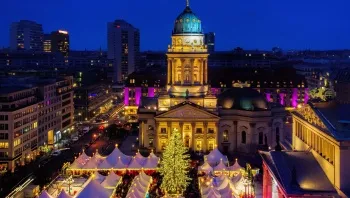
We’ll start our tour in the cheerful Scheunenviertel neighborhood. One of the most interesting sites in this quarter is the Hackesche Höfe complex, a series of eight interior, interconnecting courtyards bordered with former working-class homes. In the Jewish Quarter, we’ll see the old and new synagogues and the Jewish cemetery where Moses Mendelssohn is buried.
We’ll enjoy lunch in a local restaurant. Spend some free time this afternoon at the Christmas market in the Alexanderplatz, a must-see site in Berlin. The market includes some incredible scenes, such as the beautifully lit, giant Christmas pyramid and the rows of tiny chalet stands with handmade gifts. Our last stop will be the city’s television tower, where you’ll be transported to the top in only 40 seconds to step out onto the observation platform for a fantastic 360° view of the city at night.
PLEASE NOTE
- The order of the visits can change.
- Times are approximate.
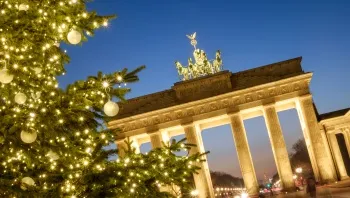
We’ll set out on a panoramic tour of Berlin all dressed up for the holidays. Our tour includes the Reichstag, Alexanderplatz, Brandenburg Gate, and Checkpoint Charlie—the scene of many spy thrillers and novels during the Cold War. At tea time, we’ll enjoy the customary Kaffee und Kuchen, a cup of coffee and delicious German cake. Our last stop will be the enchanting Christmas market in Gendarmenmarkt, one of the most beautiful squares in Berlin. This is where you’ll find the best of Berlin at Christmas. Artists show off their refined works, and every German Christmas culinary delight imaginable is for sale.
PLEASE NOTE
- The order of the visits can change.
- Times are approximate.
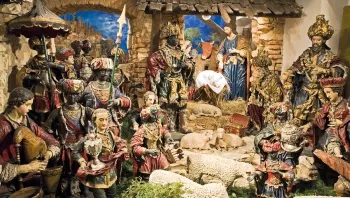
We’ll set out on foot for the center of Prague. Holiday markets pop up across the city at the beginning of December and run through the beginning of January. We'll visit the largest and most beautiful in the Old Town, where an immense Christmas tree, nativity scene, and small chalets await. This is also the perfect time to see the city's medieval-style astronomical clock—the most legendary in the world—where the Twelve Apostles appear hourly. Master clockmaker Mikulas of Kadan built the oldest part of the clock in 1410. Wooden statues were added in the 17th century, and the Apostles became the figures in the 18th century. Our sweet treat will be a tasting of the local pastry, known as trdelník, and a cup of mulled wine.
PLEASE NOTE
- The order of the visits can change.
- Times are approximate.
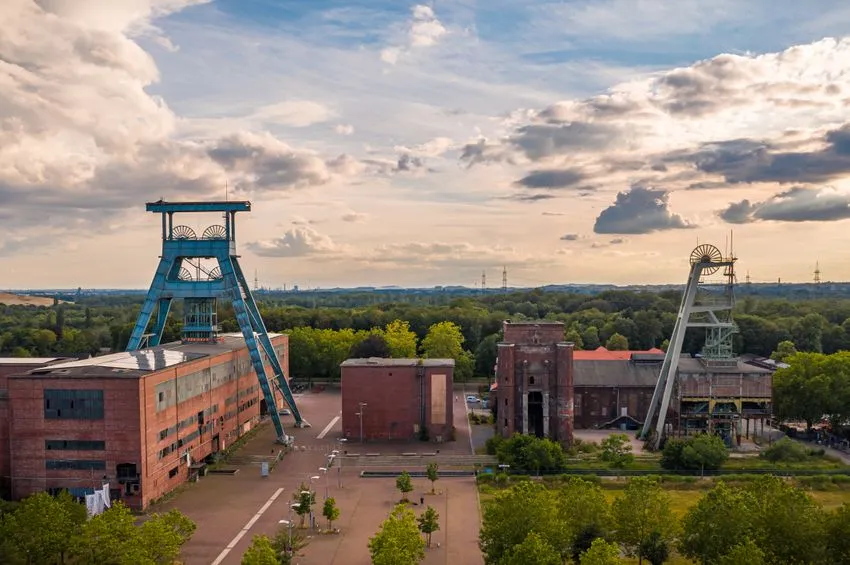
We'll set out for the Ruhr, a traditionally industrial region. A former coal mining area, this is one of the largest urban communities in Europe and boasts one of the densest cultural landscapes on the continent.
We'll stop at the German Mining Museum in Bochum—one of the most visited museums in the country and the largest mining museum in the world—to learn about the area's mining history. You'll be surprised by how the museum presents interesting perspectives on archeology, history, and metallurgy within the industry.
More than just a museum, it is also a renowned research establishment for geological resources. This interactive museum welcomes you not only in its vast exhibition hall but also in the realistically reconstructed mine shafts and levels below. You'll be able to explore over one and a half miles (2.5 km) of tunnels located 65 feet underground (20 m) as if you were actually one of the mine workers. You'll feel as if you're plunging into the depths of the earth in the reconstructed cage. The permanent exhibit aboveground provides an understanding of how the mine worked through a multimedia experience and real objects and tools from the various eras that you can use.
The site is also used for research in metallurgical, mining archeology, materials science within the laboratory and mining history documentation center.
We’ll return on board the ship in Gelsenkirchen.
PLEASE NOTE
- The order of the visits can change.
- Times are approximate.
- If the museum is closed for an unexpected reason, this excursion could be replaced with a visit to Essen and the Zollverein Coal Mine Industrial Complex.
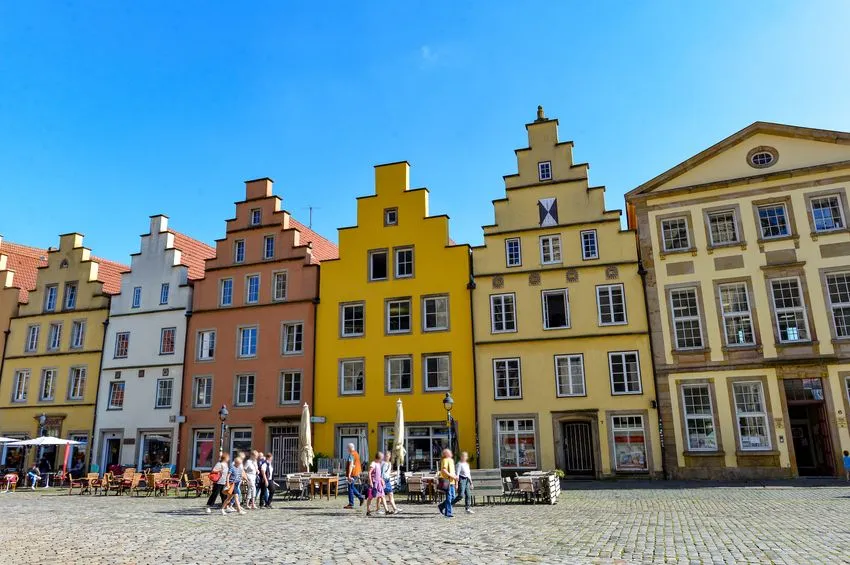
Charlemagne founded Osnabrück in the Middle Ages as an episcopal see. The city was one of the main centers of conflict during the Thirty Years' War, which prompted the battling powers to choose this city, along with neighboring Münster, to sign the Peace of Westphalia, effectively ending the war.
We'll begin the tour at the Marktplatz surrounded by typical homes and Saint Mary's Lutheran Church, whose winged altar is a 16th-century masterpiece created by an unknown German professor. The images depict Jesus up to his Ascension and the outpouring of the Holy Spirit at Pentecost. The town hall, with small turrets above and a Flamboyant Gothic-style entryway, is more than 500 years old. St. Peter's Cathedral was built in 780 AD. The current windows, including those in stained glass, were replaced after bombings during World War II.
Enjoy some time on your own after the tour to discover the multitude of hidden gems the old town's small streets have to offer. Spend time browsing and shopping in the small boutiques without the crowds.
PLEASE NOTE
- The order of the visits can change.
- Times are approximate.
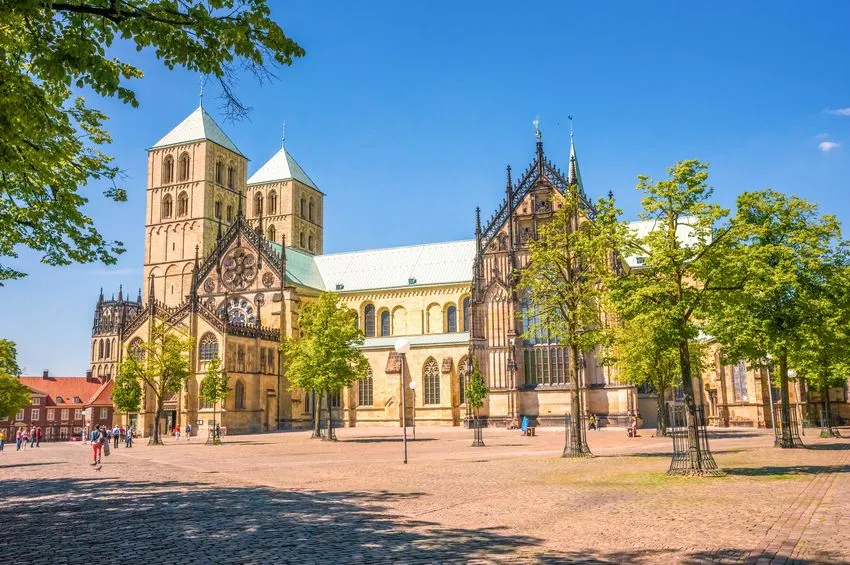
We'll set out for Münster, the historic capital of Westphalia. Münster holds a valuable place in history as the location where the Peace of Westphalia treaty was signed, ending the Thirty Years' War. Charming, picturesque, and historic, Münster is the historic capital of Westphalia, one of the most important university cities in Germany, and a fascinating city to explore. In-depth renovation has restored it to its former glory. You'll discover St.-Paulus-Dom Cathedral. Numerous works of art are found within, including 14 busts of biblical kings and prophets from the 14th century. You'll then head over to the old town to see its traditional houses, medieval arcades, and churches. The historic Prinzipalmarkt is surrounded by approximately 50 gabled houses with bowers. The town hall's Gothic facade dates back to the 14th century. The Salzstrasse evokes the city's Hanseatic times. We’ll return to the ship.
PLEASE NOTE
- The order of the visits can change.
- Times are approximate.
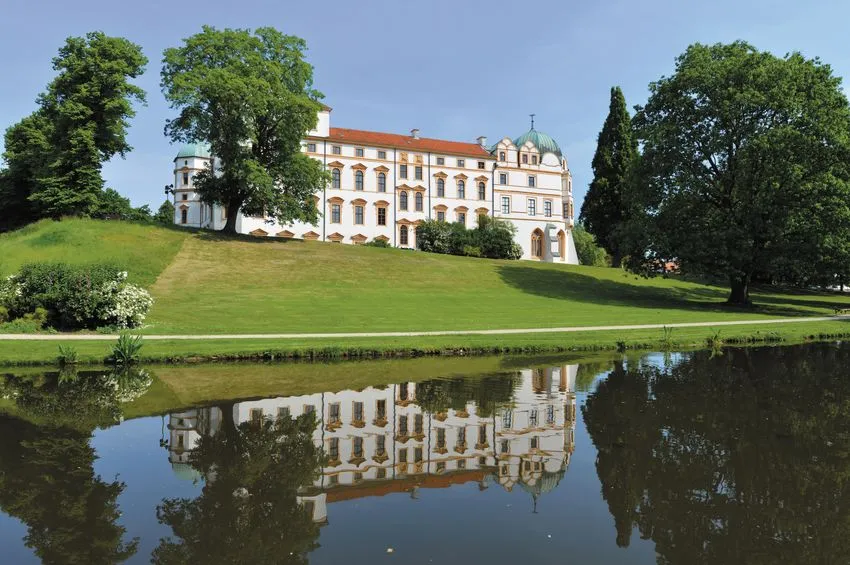
We'll hit the road for Celle, a small city with half-timbered homes and indisputable charm. We'll begin our tour with the castle whose first fortification dates back to 980 AD. The palace's stunning white facade stands out among the surrounding lush green forest. During the castle tour, you'll see the Great Hall, the baroque apartments, the kitchen with 19th-century furniture, and the baroque theater. We'll then head to the historic center of the city, home to structures from the 15th to 18th centuries. The density and beauty of its 500 magnificently restored half-timbered houses are known throughout the world. Colorful facades, golden inscriptions, and intricate carvings adorn the homes. We’ll return to the ship.
PLEASE NOTE
- The order of the visits can change.
- Times are approximate.
Departure by coach to Elbsandsteingebirge: the sandstone mountains of the Elbe. This mountain range is located on the banks of the Elbe River in Saxon Switzerland (Germany) and Bohemian Switzerland (Czech Republic). The region is known for its stunning sandstone formations and the diversity of its fauna and flora, which is unique among the middle mountains of Germany. Crossed by the Elbe, Saxon Switzerland is home to several ruins of buildings constructed to protect trade routes, such as the Königstein Fortress and Hohnstein Castle. Some of these constructions later became hideouts for bandits. You will continue with a visit to the Königstein Fortress. This fortress, built in the 13th and 16th centuries, crowns the Königstein hill and overlooks the large bend in the Elbe. Expanded in the 17th and 18th centuries, it served several times as a refuge for the Saxon court. During this festive season, you will discover the building beautifully decorated, with Herrnhut stars symbolizing the Bethlehem star, wooden pyramids, candle arches, and a multitude of Christmas figurines. Return on board.
PLEASE NOTE
- The order of the visits can change.
- Times are approximate.
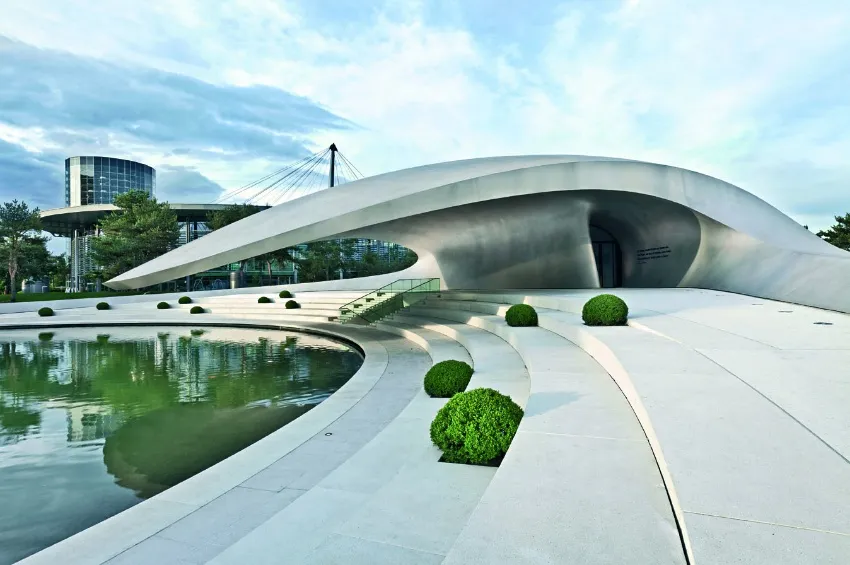
We will reach the Autostadt either on foot - a 5 min walk crossing a bridge over the Mittelandkanal - or by coach, depending on mooring and sailing conditions. The visit will begin with the Forum, an area dedicated to road safety and new energies. We'll then move on to the "ZeitHaus", the automobile museum with educational areas. Our tour will end with a visit to the Customer Center located right next to the Car Towers where customers who have ordered Volkswagens are welcome to collect them. We'll still have some free time to visit the Brand Pavilions carrying such names as Audi, Lamborghini, Skoda and more. Why not try your hand on some driving simulators or a Volkswagen SUV on rough terrain?
Return on board by coach in Sülfeld/Fallersleben or on foot in Wolfsburg.
PLEASE NOTE
- The tour does not include a visit of the production line. Passengers would have to plan their visit during their free time.
- Commentaries on the tourist train are provided in German.
- Depending on sailing, departure is either from Wolfsburg with return to the boat by coach, or by coach with return to the boat in Wolfsburg.
- The boat sails during the excursion.
- The order of the visits can change.
- Times are approximate.
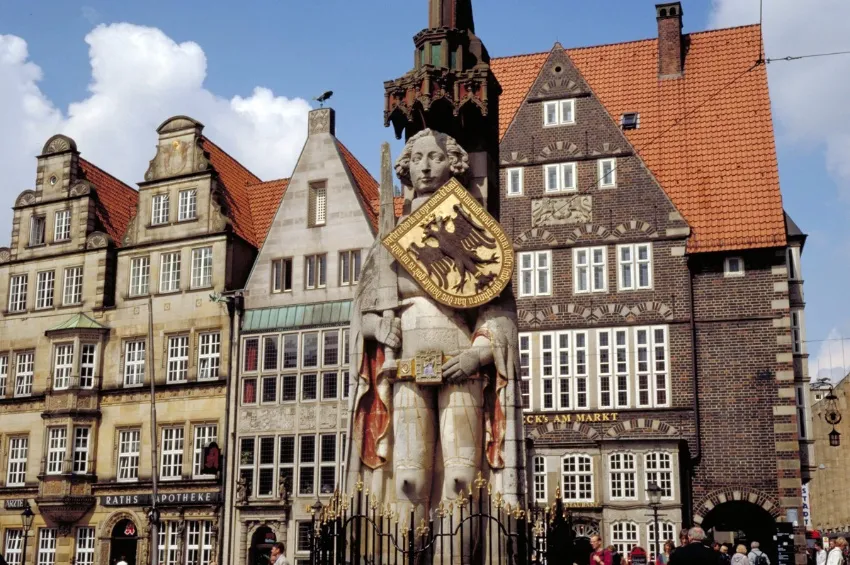
Departure with your guide to visit the historic center of this Hanseatic city.
One of the oldest German maritime cities, Bremen was granted the right to hold market as early as 965 and joined the Hanseatic League in 1358. It became a Free Imperial City in 1646 and established a direct commercial relationship with the USA in 1783. Traditionally, the city is known for its cotton and coffee trade and forms, together with its Bremerhaven fore-port, an incredibly unified Land.
Our visit will start with the working-class district of Schnoor, located on the banks of the Weser River. This is the oldest district in Bremen and its narrow streets filled with small half-timbered houses and a big Church form a charming ensemble. The neighborhood owes its name to old handicrafts associated with shipping, and the alleys between the houses were often associated with occupations or objects. There was an area in which ropes and cables were produced, giving the district its name (string = Schnoor).
We'll continue towards Marktplatz where you'll get to see St Peter's Cathedral and the wonderful City Hall in Weser Renaissance style. Also standing on Marktplatz is the 1404 statue of Roland, protector of the city, the oldest in Germany. Bremen is also famous for another statue located right behind the City Hall - the Town Musicians of Bremen. The statue depicts a donkey, a dog, a cat and a rooster with respect to the Brothers Grimm's fairy tale. Don't forget to make a wish!
Our visit ends after a walk down the Böttcherstrasse, a street famous for its unusual architectural ensemble belonging to a variant of the expressionist style. We'll pass the entrance gate with its impressive golden fresco depicting the Lichtbringer, Bringer of Light.
Free time and return on board.
PLEASE NOTE
- Good walking shoes are recommended.
- The order of the visits can change.
- Times are approximate.
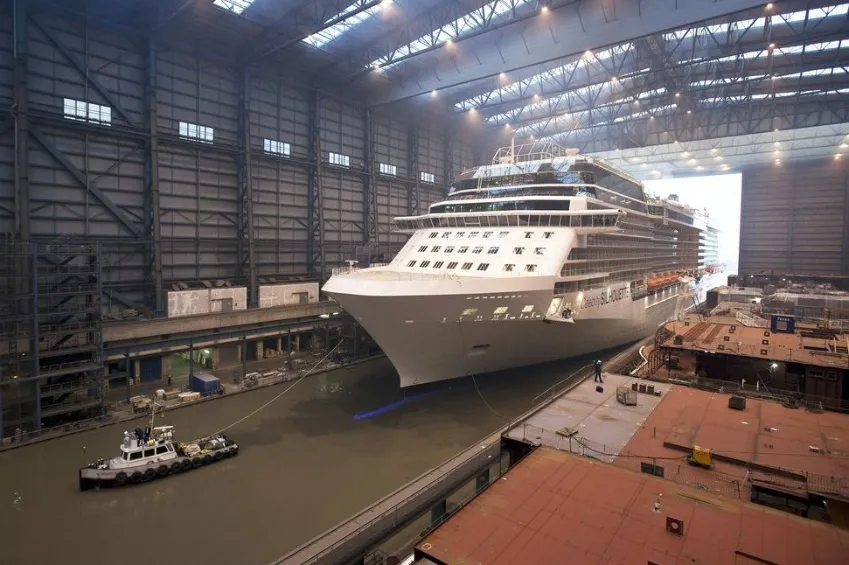
Departure by coach from the Papenburg lock towards Meyer Werft Shipyard. Founded in 1975, the shipyard has been owned and managed by the Meyer family for six generations. The first ships that were built there were small wooden vessels. Less than a hundred years later, the first iron ship was launched notwithstanding the other manufacturers mocking the idea, thinking that iron could not float. Meyer Werft gained international recognition through the construction of roll on/roll off ferries, passenger ferries, gasoline tankers, container ships, livestock ferries and most recently luxury cruise ships. Due to its upstream location on the river Ems, the giant ships to be delivered have to make a 36 km voyage to the Dollart.
A passionate guide will tell you all about the various stages in the construction of these floating sea monsters during your one and a half hour tour.
Return on board by coach after the Doerpen or Delfzijl locks.
PLEASE NOTE
- The boat will sail during the excursion.
- Visit entirely on foot in the shipyard buildings. Passengers will only see the shipyard from behind bay windows.
- Beware! Information is sometimes given in German (introduction film, notice boards etc.).
- The order of the visits can change.
- Times are approximate.
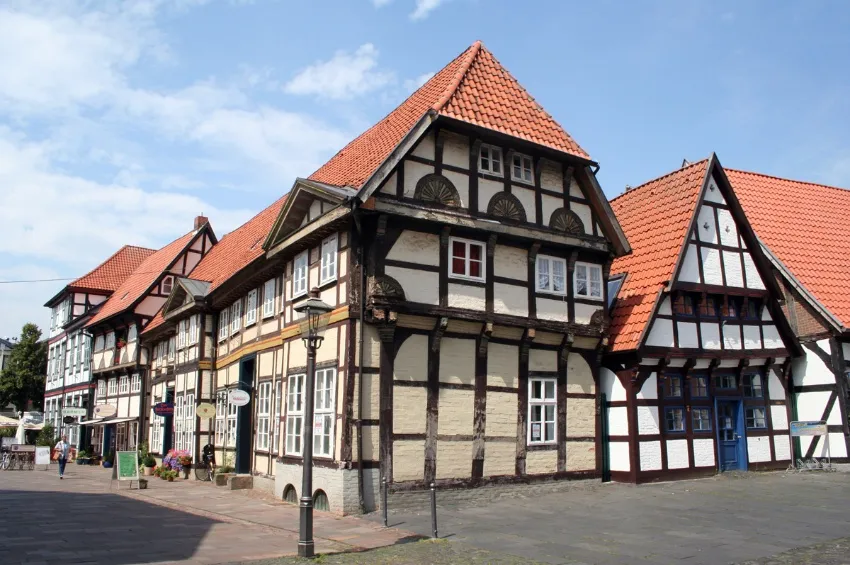
Departure by coach in the company of your hostess towards downtown Nienburg.
You'll be free to discover this beautiful little Lower Saxony town at your own pace. Nienburg is famous for its asparagus.
Charming little Nienburg was nicknamed "red town” after the red bricks most of the houses in the city center, St Martin Church and the streets were built and paved with, a style typical of northern Germany. You'll get to follow in the "bear's footsteps” down an educational pathway that was created by the tourist office, a chance for you to discover some of the town's monuments such as the Town Hall from Weser Renaissance, St Martin Church with a statue of Charlemagne standing before it as a reminder of his fight against the Celts in the region, the Kleine Nienburgerin, the bronze statue of a young child from a beloved folk song, and the former Post Office which ensured communication between the Kingdoms of Hanover and England.
Return on board in Stolzenau or Hoja.
PLEASE NOTE
- The boat will sail during the excursion.
- Passengers will visit the town on their own.
- The order of the visits can change.
- Times are approximate.

Departure by coach for Magdeburg where we will meet up with local guides.
Magdeburg was once the cradle of the German nation. The first Germanic Holy Roman Emperor, Otto the Great, had an imposing cathedral built here and made the town into an archbishopric. Magdeburg became a center for Western Christianity and the High Court of judicial power in the Middle Ages.
We'll begin our tour with the Magdeburg Cathedral, home to the tomb of Emperor Otto I the Great. Magdeburg is a Hanseatic city located midway on the Elbe River and the Roman Roads—in the heart of Germany rich with a multi-faceted history. Its other sacred monuments include the Magdalenekapelle, St. Petrikirche, Wallonerkirche, Monastery of Our Lady and St. John's Church. We'll continue our panoramic tour by seeing the city's main monuments, including the citadel. Once located in East Germany, the city has retained its grey, square, Soviet-style buildings which are embellished today with molding and decorations. We'll visit the marketplace to see the magnificent replica of the Magdeburger Reiter, as well as the town hall and its bronze door. You'll finish up the tour with some free time on your own.
PLEASE NOTE
- Beware! Depending on the water level of the Elbe river, the boat could stop at the lock of Rothensee instead of mooring in Magdeburg.
- Return to the boat will be on foot or by coach depending on water level.
- The boat will sail during the excursion.
- The order of the visits can change.
- Times are approximate.
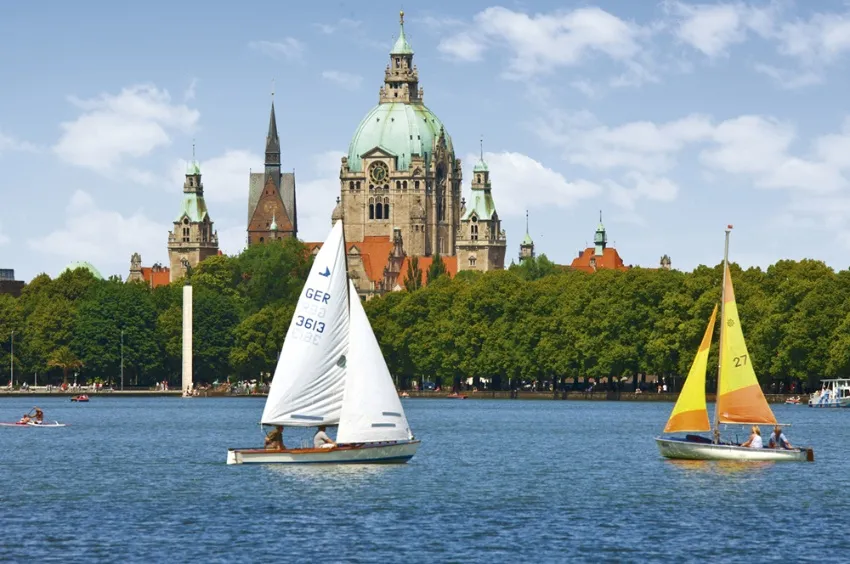
Departure by coach from the northern port of Hanover in the company of local guides to discover the capital of the Land of Lower Saxony. From the 17th century onwards, Hanover played a major role in politics. In 1714, the son of Ernst-August of Hanover became King of Great Britain under the name of George I, a personal union which was a considerable source of prestige for the principality of Hanover.
First of all you will pass alongside the famous Baroque Gardens of Herrenhausen before heading for the 18th century New City Hall, where your guides will explain Hanover's history with the help of four models showing the city at different times (1875, 1939, 1945 and today). You will continue with a panoramic city tour to see the main sights such as Niki de Saint Phalle's Nana statues on the banks of the Leine, the Maschsee - an artificial lake dug by unemployed workers on a job creation scheme in the 1930s - the Opera House, the Grand Theater, the ruins of the Aegidien Church bombed during the war and where the Peace Bell now hangs, and many more. You will stop for a stroll through the Old Town, to see the Market Church and its curiosities, the 15th century Old City Hall and Leibniz's House.
The visit ends at the bus station where our coach will drop you off and you'll bid your guide goodbye. Free time in the central station area and the modern city center.
Departure from Hanover to return on board at Hanover Anderten or Minden.
PLEASE NOTE
- Visit by coach with stops at the New City Hall and in the old town.
- The boat will sail during the excursion.
- The order of the visits can change.
- Times are approximate.
